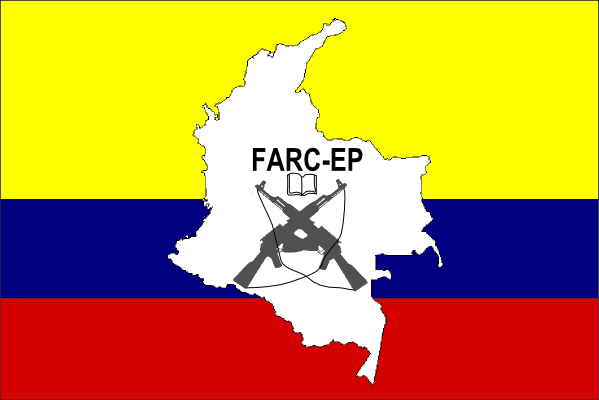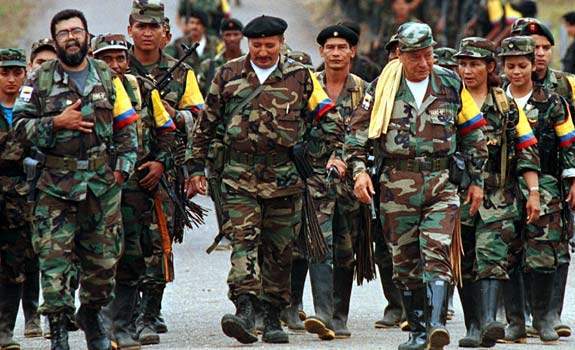More languages
More actions
The Revolutionary Armed Forces of Colombia – People's Army (FARC-EP) is an organization in Colombia which previously had been in conflict with the Colombian government from 1964 to 2016.
The Revolutionary Armed Forces of Colombia – People's Army | |
|---|---|
| Fuerzas Armadas Revolucionarias de Colombia – Ejército del Pueblo | |
 | |
| Established | April 11, 1964 |
History[edit | edit source]
The conflicts between FARC and the government have killed between 22,000 people and 260,000 in total and caused the displacement of between 5 and 7 million.[1][2][3]
Peace-talks have been handled in Havana since 2012.[1]
The peace talks have been supported by the UK who have contributed £4.2 million to a UN fund, and £1.1 million to an EU fund for the continuation of peace movements. UK Foreign Secretary Philip Hammond had meet with Minister for Defence and the Vice Minister for Foreign Affairs and the National Reintegration Agency in April of 2016.[4]
On January 29, 2015 the 3rd Summit of the Community of Latin American and Caribbean States (CELAC) agreed to help promote peace talks with FARC at their meeting in Belen, Costa Rica.[5]
On March 19, 2015 FARC argued that their ceasefire they had ordered in December was being subverted by the military. They requested President Juan Manuel Santos’s intervention to help save the ceasefire.[1]

Cuba had been on the USA’s State Sponsors of Terrorism List since 1982 in large part for its support for FARC. The U.S. State Department recommended Cuba’s removal from the list in April of 2015 after Obama’s order to review Cuba’s placement on the list. Cuba had played a large part in the peace talks between the Colombian government and FARC. Juan Manuel Santos had expressed gratitude for Cuba’s role in the peace process.[6] Obama ordered Cuba’s removal from the list on April 14, 2015.[7]
On September 26, 2016, the Colombian government and FARC made a peace deal. The Colombian president, Juan Manuel Santos and the then FARC commander-in-chief Timoleon Jimenez met in Cartagena. They were with representatives from Cuba, Ecuador and other Latin American countries, as well as Ban Ki-moon, UN Secretary-General.[3] The guarantors were Cuba and Norway and the accompanying countries were Chile and Venezuela.[2] The peace treaty was, in the end, denied. On October 2, 2016 Colombians voted 50.21 percent to 49.78 percent to deny it. The decision to reject the peace deal was celebrated by former president Alvaro Uribe and his Democratic Center as they saw it too lenient on FARC. Though the peace treaty was denied, the ceasefire was continued.[8] Juan Manuel Santos was awarded the 2016 Nobel Peace Prize for this efforts in peace making.[9][10] The peace treaty was widely followed through on for the following years. Though a few former FARC commanders had stated they were to restart the civil war, 3,500 former soldiers were involved in productive projects as of 2019. Violence against former combatants had also occurred, with at least 20 being killed.[11][12] The peace was highly supported by the PRC.[13][14][15][16]
Of the former FARC leadership who had announced a return to armed struggle in 2019, one was suspected as being behind an attack on President Ivan Duque.[17] He was called Aurelio and was accused of shooting at Duque’s helicopter in the Norte de Santander department in Cucuta on June 25, 2021. He was caught in November of that year.[18] In February 2022, 15 FARC dissidents of 10th front, who were still engaged in violence, were killed. These included Jorge Eliecer Jimenez who was referred to as Arturo. This mission also caused the injury of 5 FARC dissidents.[19] On May 25, 2022, a FARC dissident leader by the name of Miguel Botache Santanilla and who was called Gentil Duarte was killed while sleeping at a FARC camp by another dissident group.[20] In July of 2022, another FARC leader named Roque Antonio Gonzalez was killed. He was referred to as Roque and lead GAOR E-33 in Tibu, Norte de Santander.[21]
References[edit | edit source]
- ↑ 1.0 1.1 1.2 "Colombian rebels urge president to "save" unilateral ceasefire" (2015-03-20). People's Daily Online. Retrieved 2023-09-13.
- ↑ 2.0 2.1 "UN chief hails peace deal to world's longest armed conflict in Colombia" (2016-08-25). People's Daily Online. Retrieved 2023-09-13.
- ↑ 3.0 3.1 "Colombian gov't, FARC sign historic peace deal" (2016-09-27). People's Daily Online. Retrieved 2023-09-13.
- ↑ "UK Foreign Secretary arrives in Colombia for visit to highlight support for the country’s peace process and fight against narcotics" (2016-04-28). People's Daily Online. Retrieved 2023-09-13.
- ↑ "Cooperation with China hot topic at CELAC summit" (2015-01-30). People's Daily Online. Retrieved 2023-09-13.
- ↑ "Obama says not decided whether to remove Cuba from terror sponsors list" (2015-04-15). People's Daily Online. Retrieved 2023-09-13.
- ↑ "Cuba welcomes Obama's decision to remove it from terror sponsors list" (2015-04-15). People's Daily Online. Retrieved 2023-09-13.
- ↑ "Peace process in Colombia halted" (2016-10-04). People's Daily Online. Retrieved 2023-09-13.
- ↑ "2016 Nobel peace prize provides hope to Colombian people: UN chief" (2016-10-08). People's Daily Online. Retrieved 2023-09-13.
- ↑ "Colombian President Santos wins 2016 Nobel Peace Prize" (2016-10-08). People's Daily Online. Retrieved 2023-09-13.
- ↑ "Colombian peace process moves forward through challenging period: UN envoy" (2019-10-11). People's Daily Online. Retrieved 2023-09-13.
- ↑ "UN envoy hails peace dividends in Colombia, warns against violence" (2022-04-13). People's Daily Online. Retrieved 2023-09-13.
- ↑ "China congratulates Colombia on historic peace deal" (2016-09-27). People's Daily Online. Retrieved 2023-09-13.
- ↑ "China supports Colombia in continuing to implement peace agreement: envoy" (2021-07-14). People's Daily Online. Retrieved 2023-09-13.
- ↑ "Chinese envoy asks for peace through development in Colombia" (2020-07-15). People's Daily Online. Retrieved 2023-09-13.
- ↑ ( "Chinese envoy calls for continued implementation of peace accord in Colombia" (2023-01-12). People's Daily Online. Retrieved 2023-09-13.
- ↑ "Colombian peace process moves forward through challenging period: UN envoy" (2019-10-11). People's Daily Online. Retrieved 2023-09-13.
- ↑ "Colombia catches suspected organizer of attack on president" (2021-11-07). People's Daily Online. Retrieved 2023-09-13.
- ↑ "15 FARC dissidents killed during military operation in Colombia" (2022-02-25). Xinhua. Retrieved 2023-09-13.
- ↑ "Ex-FARC dissidents confirm death of top leader "Gentil Duarte"" (2022-06-01). Xinhua. Retrieved 2023-09-13.
- ↑ "FARC dissident leader killed in Colombia" (2022-07-18). Xinhua. Retrieved 2023-09-13.
